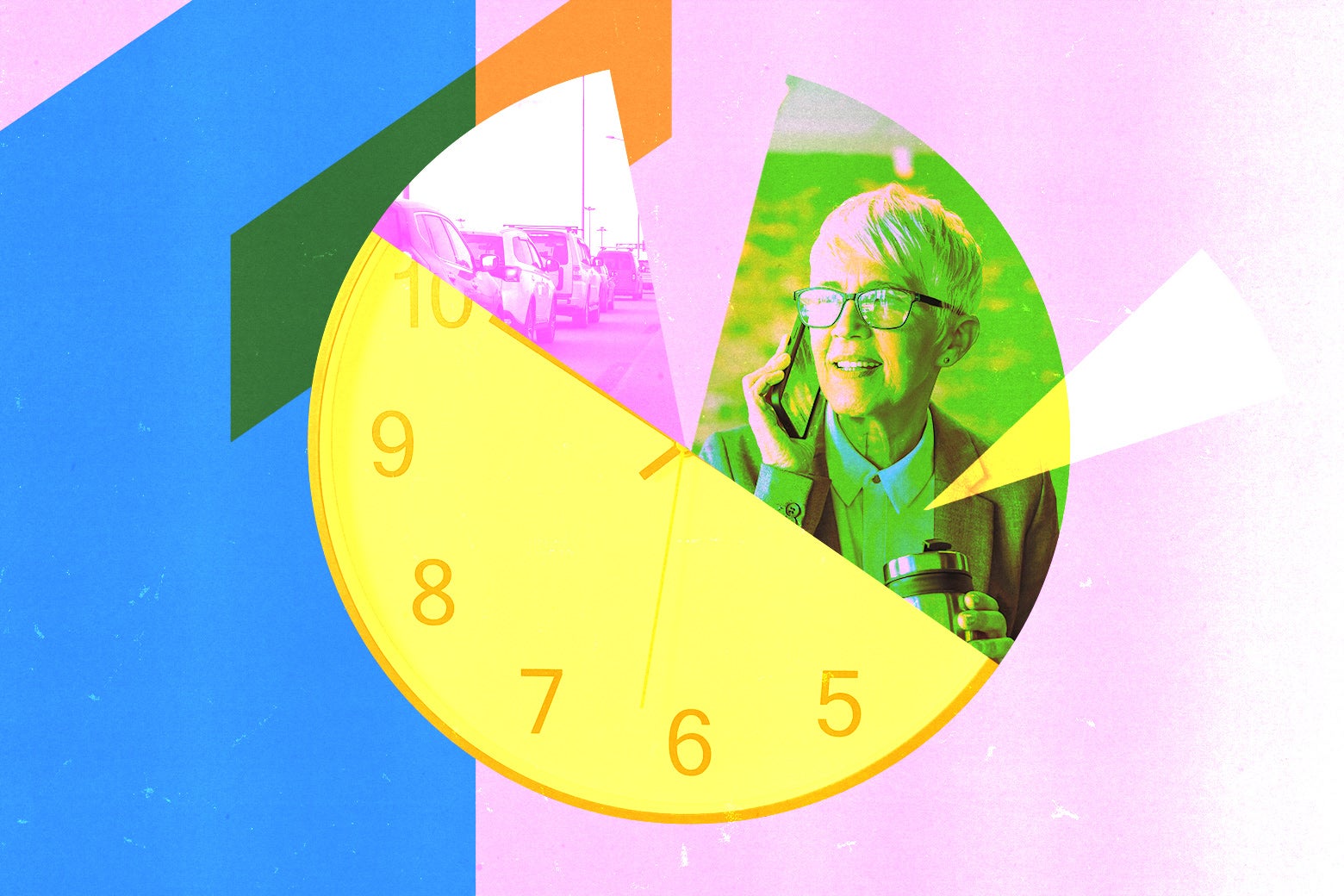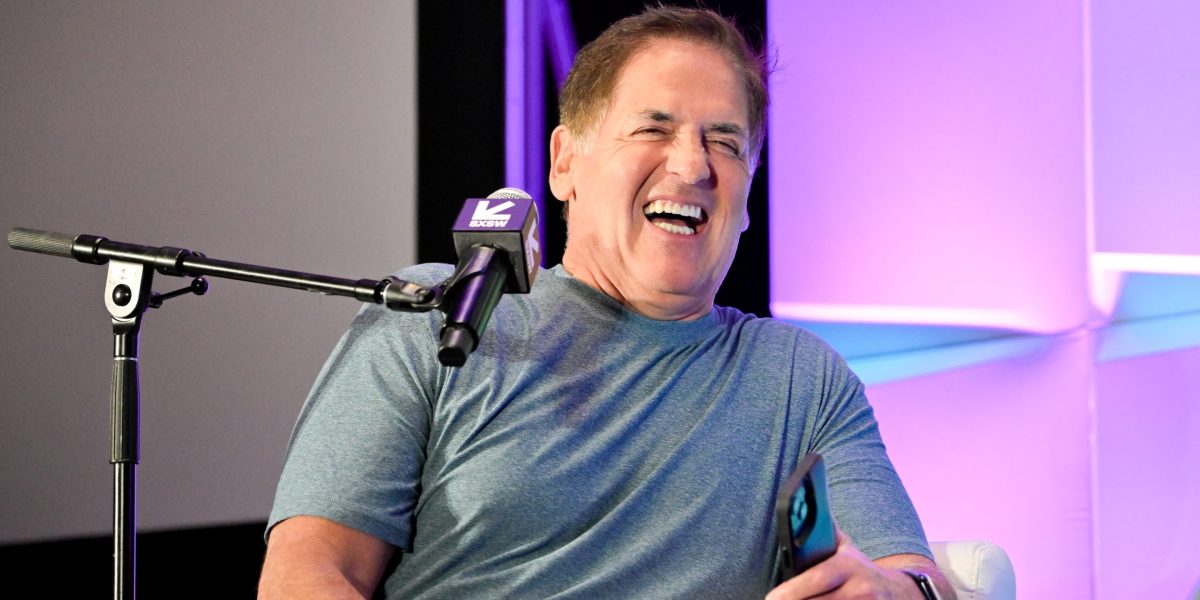#work-life-balance
#work-life-balance
[ follow ]
#remote-work #burnout #productivity #parenting #mental-health #return-to-office #gen-z #startup-culture
fromBusiness Insider
20 hours agoA partner at Goldman Sachs says mastering this skill has helped her balance work and raising 7 kids
Around one in four employees at Goldman are engineers, and Cohen held various engineering leadership roles before becoming a partner in 2024. Her current team now automates the asset management business' operations to help it scale.Goldman's asset and wealth management division holds a record $3.6 trillion in assets and has grown under CEO David Solomon's leadership.Cohen's approach to delegation plays out both at work and at home. Some responsibilities, Cohen said, are "truly non-discretionary," but others can be passed on either to colleagues at work or family members at home.
Women
fromQuartz
21 hours agoEmployees now value work-life balance more than money
Resume Builder reported last October that 30% of companies will eliminate remote work in 2026. According to a survey of business leaders by Vena Solutions , a private financial software company, 83% of CEOs globally anticipate a return to full-time office work in 2027. But what if there's a better way to frame this conversation? What if the focus shifts away from where employees are working to when employees are working?
Productivity
Venture
fromFortune
1 day ago'You're not a hero, you're a liability': Shark Tank's Kevin O'Leary warns Gen Z founders to stop glorifying hustle culture | Fortune
Gen Z founders should prioritize sleep, nutrition, exercise and focused work instead of glorifying extreme hours, as self-care optimizes performance and long hours are counterproductive.
Business
fromFortune
3 days agoRyan Serhant starts work at 4:30 a.m.-he says most people don't achieve their dreams because 'what they really want is just to be lazy' | Fortune
Aggressive, highly scheduled work habits prioritize productivity over work-life balance, treating time as money to achieve ambitious professional goals.
fromBusiness Insider
3 days agoI moved from the US to Finland for grad school and stayed to work. The pay is lower, but the work-life balance is great.
I studied abroad in Spain, and really loved it there. It opened my world and gave me more perspective, so I knew I wanted to go abroad after I graduated. I was interested in bioenergy, and that industry isn't very developed in the US. After doing some research, I landed on Finland, which has a huge forestry and bioenergy industry. The Nordics, in general, also have a lot of English-language master's degree programs. Through a Fulbright scholarship, I moved to Finland to pursue my master's degree.
Miscellaneous
Artificial intelligence
fromSocial Media Explorer
4 days agoHow AI is Changing the Hiring Landscape for Good - Social Media Explorer
AI will create millions of jobs by augmenting human capabilities, easing tedious tasks, improving hiring, enabling upskilling, higher pay, work-life balance, and employee loyalty.
fromwww.theguardian.com
5 days agoI don't like organised fun, but Dungeons and Dragons is my shining nerdy light amid the darkness | Patrick Lenton
I wish this was a one-off blip in my regimented friendship schedule, but all through 2025 I played the world's slowest game of message tennis. I'd invite a pal for dinner, only for the world to turn, the seasons pass, grey hairs gather at my temples, before a date was finally locked in. This sentiment seems to be common among my circle.
Relationships
fromwww.dw.com
6 days agoCDU, Merz target 'lifestyle part-time' work in Germany
Germany's part-time workforce has indeed increased significantly over the decades, but that is due in large part to families no longer being able to survive on a single income, as well as technological changes that have left many people choosing part-time work over no work at all. Citing data from Germany's federal statistics agency, DeStatis, MIT has pointed out that in 2022, 27% of part-time workers in Germany reported their reasons for not working full-time as simply "a desire to work part-time."
Germany news
fromFast Company
1 week agoIf work leaves you no time for life, try this calendar trick
They may be spending a lot of combined time at the office and commuting, or just putting in a lot of hours both at work and at home. Fixing that problem can't be done abstractly, though. If you're going to address the balance of work and life activities, you have to start getting specific about where your time is going and where you really want it to go.
Productivity
fromBusiness Insider
1 week agoFinland is trying to poach top tech and AI talent from the US with 2-week visas and better work-life balance
The effort comes as competition for AI talent intensifies worldwide and tech workers in the US grapple with layoffs, burnout, and visa complications. According to BCG's 2024 talent tracker report, the US remained dominant in attracting AI talent worldwide. Already known for its tech scene, Finland, with a population of around 5.6 million, is positioning itself as a place where American tech workers can find a better work-life balance without sacrificing their careers - a notable contrast to the famous grindset of Silicon Valley.
Careers
Mental health
fromYourTango
1 week agoPeople Who Don't Answer Emails At Night Usually Do These 4 Things To Have A Life Beyond The Inbox
Establish and enforce personal boundaries—such as prioritizing self-care and limiting phone/email access—to prevent work from overflowing into personal life and causing burnout.
FC Barcelona
fromBarca Universal
1 week agoBarcelona veteran's wife opens up on life after football: 'He told me that when he retires...' | Barca Universal
Moving to Spain brought warmth, spontaneity, and a new family routine; Anna balances supporting Robert while maintaining her own career and identity.
Business
fromFortune
1 week agoJamie Dimon's reality check for ambitious workers: 'There's going to be a grunt part to every part of a job. Get over it' | Fortune
Accept that every job includes grunt work; prioritize long-term career development and commitment over immediate gratification and frequent job changes.
fromBusiness Insider
1 week agoI spent years traveling nonstop. It took me too long to admit my 'dream life' was actually horrible for my health.
In reality, the job of my dreams consisted of overnight flights where I'd get little to no rest, then hit the ground running as soon as I arrived at my destinations. After I'd fly back home from some trips, it would take me nearly a week to recover from jet lag. My stress levels were often cranked up, dealing with flight delays, deadlines, and navigation across different states and countries.
Health
Parenting
fromFortune
2 weeks agoThis CEO has a '1950s family structure in reverse'-her husband does the child care, cooking and cleaning: 'I do the making money and paying taxes' | Fortune
Lauren Antonoff runs an organic, month-focused CEO routine with flexible days, later starts, and a reversed household division where her husband managed caregiving.
Mental health
fromBusiness Insider
2 weeks agoI did my 5-day vacation all wrong. An expert says here's what I should have done differently to optimize rest.
Taking intentional time off can still cause exhaustion when unpaid domestic and caregiving labor and small decisions replace work, preventing true rest.
fromInside Higher Ed | Higher Education News, Events and Jobs
2 weeks agoReflections of a Former Presidential Spouse (opinion)
Denise and I met at our new faculty orientation, which seems like a lifetime ago, and grew up together as academics. She chose administration early on, and I taught for decades before giving up faculty status to become a full-time fellowship director. As she advanced from dean to provost to president, my role as the administrative "trailing" spouse altered in both subtle and overt ways at each new institution, but the core was always rooted in our dedication to the universities we served and to each other.
Higher education
fromNature
2 weeks agoDuring the course of my PhD, I've been relearning how to rest
Somewhere along the way, I started wearing burnout like a badge of honour. In weekly lab check-ins, I make sure to mention I was in the lab over the weekend - slipping in a quiet signal that I was going above and beyond. I've made sure to send e-mails early in the morning or late at night to demonstrate I was working long hours.
Mental health
fromBusiness Insider
3 weeks agoJennifer Lawrence says a 15-minute compromise helps her and her husband make their differences work
"I married somebody who is the opposite of me. He is so organized," Lawrence said during an appearance on Tuesday's episode of the "Smartless" podcast. "He's an anchor. Everything is ordered, like on the sink. Like I have to, you know, like keep the closet doors closed, and I have like my little jobs that I work really hard to do," she said.
Film
Parenting
fromSlate Magazine
3 weeks agoThere Was Only One Way My Ex Could Keep Up With His Demanding Job. When I Left, It All Fell Apart.
Shared custody and household consolidation improved the primary caregiver's well-being and career despite reduced income; children's routines stabilized, while the ex's job struggles created money-related stress.
France news
fromBusiness Insider
3 weeks agoWe left the Bay Area to care for my mother-in-law in the South of France. The visa was easy - everything else wasn't.
A family moved from the Bay Area to France in 2023 to care for an Alzheimer’s-affected relative while pursuing a more balanced life for their young children.
Television
fromFortune
3 weeks agoSarah Jessica Parker says she only has work-life balance because of the people supporting her: 'I'm making choices differently than I used to' | Fortune
Sarah Jessica Parker won the 2026 Carol Burnett Award and now prioritizes selecting flexible projects that support her off-set life and work-life balance.
fromBusiness Insider
3 weeks agoMichael Bloomberg says young people tend to make the same mistake when choosing a job
Michael Bloomberg may be worth more than $100 billion, but he doesn't think that salary is everything when it comes to early jobs. "People make the mistake of going to work for a place where they get paid the most. Particularly when you're young, that's not what life is about," Bloomberg said in an interview with Nicolai Tangen, the CEO of Norges Bank Investment Management, that aired on January 7.
Careers
fromFortune
4 weeks agoExperts are divided on how workers should spend their 5-9: Structure is key for productivity, but can lead to burnout | Fortune
That title's not a typo. The 5-to-9 is the time period before and after the 9-to-5 workday. Social media influencers have racked up millions of views showing off their outside-of-work schedules-#5to9routine has more than 35 million views on TikTok. During these videos, quick cuts of clips show off aspirational mornings and evenings packed with journaling, working out, meditating, cleaning, side hustling, and more. The trend's an offshoot of the " 5am club," which counts Mark Zuckerberg and Michelle Obama as early-rising members.
Wellness
Remote teams
fromFortune
1 month agoBosses are fighting a new battle in the RTO wars: It's not about where you work, but when you work | Fortune
Workplace conflict has shifted from location to control over time, with employees prioritizing schedule autonomy and work-life balance over workplace mandates.
fromBusiness Insider
1 month agoI had a stroke at 29 and went back to work weeks later. It taught me how to lead through a crisis - and to give grace to myself and my colleagues
I was off work for a few weeks, but without paid leave I had to return sooner than doctors advised. I worked from home for a few months since I still couldn't drive. I loved the challenge of the work, the way no day was ever the same, and I had thrived on that pace. But I was still recovering. Winded by the smallest physical activity, I struggled with memory, and words sometimes came out scrambled or not at all.
Medicine
fromBusiness Insider
1 month ago7 people who switched careers in their 30s, 40s, 50s, and 60s share how they knew it was time to pivot
Planning a career pivot raises some big questions: in which direction should you move, how do you make the shift, and, crucially, when is the right time to do it? In 2025, Business Insider spoke to professionals who made mid-career pivots, including some who did so more than once. Have you made an unconventional career move? If you're comfortable discussing it with a reporter, please fill out this quick form.
Careers
Business
fromFortune
1 month agoCEOs say they are unplugging from the top job by cancelling all meetings and playing with Legos over the holidays | Fortune
CEOs often remain on-call during holidays but carve small boundaries and rituals—like dedicated weeks, adventures, sports, and family cooking—to reclaim downtime.
Mental health
fromwww.housingwire.com
1 month agoLoan Officer Mental Health: How to Recognize & Prevent Burnout
Mortgage loan originators face high burnout risk due to long hours, pipeline instability, financial uncertainty, and emotional strain, requiring lifestyle, business, and support interventions.
Mental health
fromFortune
1 month agoNew billionaire Beyonce's advice for success starts with saying 'no' more: 'If I'm not going to sleep dreaming about it, it's not for me' | Fortune
Selective boundary-setting and ownership of high-margin creative assets transformed intensive early overwork into sustainable, highly profitable success and billionaire status.
fromBusiness Insider
1 month agoWhile I led my company through a $150 million acquisition, my husband handled the parenting. Here's how we make it work in our house.
I was entirely on my own when I was 19. While I was enrolled in college, I worked full-time at night in the call center of a fintech company, Jack Henry & Associates. It was a gritty, hands-on role, but an exciting time to be with the company, which was growing quickly. I didn't have a typical college experience. I worked a lot so I could pay for my car and home. At work, I put my hand up any chance I could. I was never the smartest person, but I worked really hard and was always willing to figure out problems. Even if I'd never done something, I would figure it out. I couldn't afford to fail, personally or professionally.
Startup companies
fromBusiness Insider
1 month agoWe spent a year abroad in France and enrolled our kids in a local school. Coming home was bittersweet.
After the pandemic, I realized life was too short to keep saying "one day." Sitting on the dock at my parents' cottage in Ontario, the sun melting into the lake, it hit us: "If not now, when?" Almost a year later, in September 2023, we packed up our two kids and moved to the South of France for a year.
Canada news
Mindfulness
fromFast Company
1 month agoHere's why visiting museums between Christmas and New Year's makes me a better leader
Full-day museum visits during the holiday slowdown provide uninterrupted presence and reflection that refuels creativity, clarifies priorities, and returns leaders to work with renewed energy.
fromenglish.elpais.com
1 month agoCorinne Low: I'm more concerned about the female happiness gap than the gender wage gap'
even when women are the primary breadwinners, they perform two to four times more housework than men. Their research explores how households could benefit if lower-income men adjusted their schedules to take on more domestic tasks and allowed higher-income women to work longer hours outside the home. Their analysis revealed that the time women spend on housework decreases after divorce, while men's time increases.
Women
fromFast Company
1 month agoHow solopreneurs can break free from a corporate mindset
You quit the 9-to-5 to have more control over your time. You wanted flexibility, autonomy, and the freedom to structure your days around your life instead of someone else's schedule. Yet here you are, apologizing to a client for not responding to a message immediately. Feeling guilty on a Tuesday afternoon when you've only worked for four hours that day. Checking Slack at 9:00 PM because that's been your routine for most of your working career.
Productivity
fromFast Company
1 month agoHow to wind down for the year
Research going back almost 100 years finds that when you have a task to complete, you are highly motivated to finish it. It stays active in your memory, and you seek opportunities to get it done. That tendency is normally a good one. But on a break, it is a factor that will drive your mind back to the workplace-even when you're supposed to be relaxing. To give yourself the best chance to chill, see if you can close out key tasks before you leave. At a minimum, reach a good stopping place on tasks so that you don't feel like you have left them incomplete.
Software development
Media industry
fromPoynter
1 month agoInside the training that centers 'closeness and intimacy and safety and resolve and optimism' - Poynter
Leadership development equips women and nonbinary newsroom leaders with skills to navigate industry instability, negotiate effectively, manage cross-generational teams, delegate purposefully, and balance work-life demands.
Music
fromFortune
1 month agoWill.i.am grinds from 5-to-9 after his 9-to-5-because work-life balance is for people 'working on someone else's dream' and not for visionaries | Fortune
Use after-work '5-to-9' hours and prioritize dream-reality balance over work-life balance to build ventures that do not yet exist.
Relationships
fromBusiness Insider
1 month agoI'm a founder struggling to date. I take note of how men react to my success and am fast at weeding people out.
A busy NYC startup founder prioritizes a demanding startup, avoids dating other early-stage founders, and seeks partners who respect her schedule and ambition.
[ Load more ]














